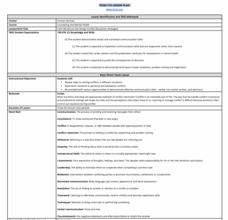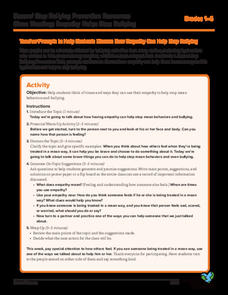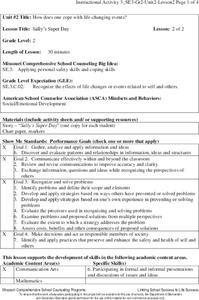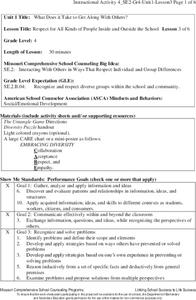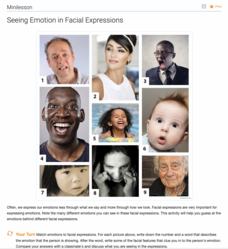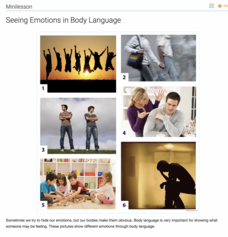Angel Island Immigration Station Foundation
Conditions in China: Why Might One Leave Home Forever?
Primary source texts provide scholars with the background information they need to understand why Chinese peasant farmers were driven to emigrate. After underlining keywords, phrases, and/or lines in the texts, individuals craft a...
Humane Education Advocates Reaching Teachers
Justice for All - Educating Youth for Social Responsibility: Grades 6-8
Teach middle schoolers how to develop healthy relationships with activities and lessons designed to create a kind and inclusive
classroom. Pupils create guidelines to develop a safe and civil learning environment. They learn how to...
Texas Education Agency (TEA)
Can’t We All Just Get Along? Conflict Resolution Strategies
Respond rather than react—that's the big idea behind a lesson on conflict resolution strategies. A richly detailed plan teaches high schoolers strategies for resolving conflicts. Pupils play charades, engage in verbal and non-verbal...
Teaching Tolerance
Participating in Digital Communities
It's possible to promote inclusion and empathy on the Internet—it just takes effort! Scholars read and discuss a short story about being a friend online. Then, pupils role-play appropriate ways to respond to hate within a digital...
Teaching Tolerance
Constructively Engaging in Digital Communities
Say no to hate speech! Pupils discover the importance of practicing empathy and inclusivity in digital communities and discuss strategies for responding to online hate speech. Then, small groups develop and present class guidelines for...
Nemours KidsHealth
Empathy: Grades 9-12
Empathy can be the glue that holds a society together. Learning how to see and appreciate a situation from another's point is key to developing empathy toward others. The two activities in this resource are designed to help teens...
Greater Good Science Center
See The Good Challenge
Scientists study all sorts of things. For example, studies show that it feels good to feel grateful. Feeling grateful also contributes to physical health and strengthen relationships. In the second lesson about gratitude, class members...
University of Oklahoma
Learning About Special Education
The lessons in the second unit in a three-unit series provide students with the historical background of disability education. After reading about events that impacted attitudes towards disabilities and how learners are identified for...
Facing History and Ourselves
Speaking Up and Speaking Out
The final lesson in the Standing Up for Democracy unit offers class members a way they can stand up and speak out by crafting spoken word poetry, or Slam poetry. After analyzing several examples, individuals reflect on one positive...
Facing History and Ourselves
Protesting Discrimination in Bristol
Using the Bristol Bus Boycott as a case study, class members examine the strategies and levels of power protesters used to effect change. The two-day lesson concludes with individuals reflecting on the actions they might take in face of...
Committee for Children
Class Meeting: Empathy Helps Stop Bullying
A lesson instills the importance of how empathy has the ability to aid in stopping bullying behavior. Scholars discuss, in-depth, a series of three questions. Using class input, an anchor chart is made then displayed for reference.
Missouri Department of Elementary
Sally’s Super Day
After having a bad day, Sally took scholars' suggestions and had a super day. Pupils listen to her newest short story then discuss the events that occurred. They sort each event by what was in her control and what was not. Participants...
Missouri Department of Elementary
Respect for All Kinds of People Inside and Outside the School
Why is it important to embrace diversity? Scholars explore the topic by learning about the CARE acronym: Collaboration, Acceptance, Respect, Empathy. They also complete a diversity puzzle worksheet and play a collaborative game that...
Whole Person Associates
Teen Choices Workbook
The exercises and activities in the 28-page Teen Choices Workbook are designed to provide teens with the tools they need to become thoughtful decision makers, to act responsibly, to reflect on past decisions, and to take responsibility...
Missouri Department of Elementary
I Know What You Did This Summer
Developing and maintaining healthy interpersonal relationships is difficult, especially as middle schoolers begin dating. A short activity permits eighth graders to practice their skills as they consider how they should respond to a...
Nemours KidsHealth
Getting Along: Grades 6-8
Three activities are designed to help middle schoolers develop the skills they need to get along with others, to develop tolerance and appreciation for similarities and differences, and to generate strategies for resolving conflicts. The...
Nemours KidsHealth
Empathy: Grades 6-8
Middle schoolers develop an understanding of what empathy is and learn what they can do to show compassion to others with the help of articles and activities in a four-page packet. Learners develop PSAs to post around the school, engage...
Missouri Department of Elementary
Juggling New Opportunities
Life is like trying to juggle three tennis balls! That's the big idea in a lesson that asks freshmen to consider that sometimes juggling the areas of their lives (social/emotion, academic, and career) runs smoothly and sometimes not so...
Western Justice Center
Underlying Needs
Conflicts arise when underlying needs are unmet. An engaging video introduces viewers to nine basic human needs. Then, through a series of videos, worksheets, and activities, class members learn that by focusing on interests and needs,...
Thoughtful Learning
Taking Action Against Bullying
A mini-lesson offers suggestions for young learners on how to take action against bullying, both for themselves and others. Individuals then craft a paragraph about strategies they might use.
Thoughtful Learning
Seeing Emotion in Facial Expressions
Learning to read body language, especially facial expressions, is the focus of a mini-lesson. Young learners examine a series of photographs, identify the emotion being illustrated, and then discuss the cues that revealed the emotion.
Thoughtful Learning
Recognizing Bullying
Boost social awareness with an activity that challenges scholars to recognize bullying. Participants read 10 scenarios and respond after carefully examining behaviors such as body language, facial expressions, and frequency.
Thoughtful Learning
Seeing Emotions in Body Language
Scholars test their skills of reading body language with a collaborative learning experience that focuses on showing and identifying emotions. Pairs take turns acting out an emotion, one uses body language while the other guesses what...
Transforming Education
Social Awareness Strategies
What are the benefits of developing social awareness? Using the resource, readers learn strategies for fostering civil discourse, creating a participatory classroom, and enhancing family involvement. Scholars also take a personality...




